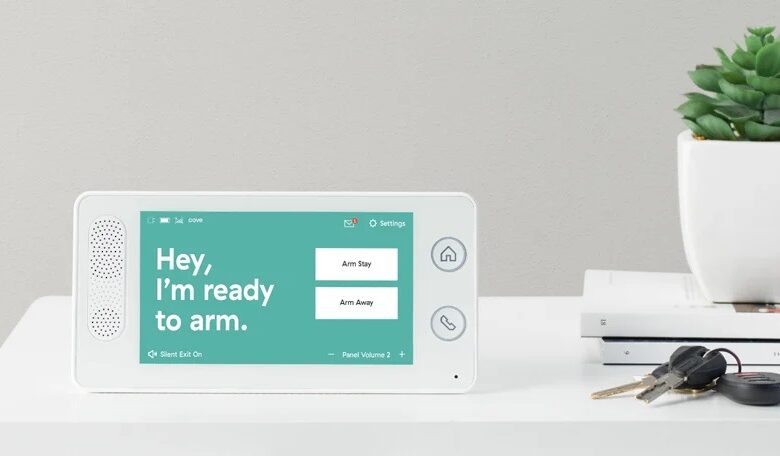The Complete Guide To Home Alarm Systems

This post will explain complete guide to home alarm systems. We have gathered all the details you require about home alarms, including installation and pricing as well as maintenance and monitoring. All of us desire the home of our homes and loved ones. Theft from your home can feel like a breach of privacy in addition to being a financial loss. With the use of a home alarm system, it is feasible to significantly lower the likelihood of your home being targeted for crime, even though it is not impossible to prevent your home from ever being a target of crime. We’ll cover everything you ought to know about home alarm systems in this comprehensive guide, including what they are and how they operate as well as the many varieties and associated costs.
The Complete Guide To Home Alarm Systems
In this article, you can know about The Complete Guide To Home Alarm Systems here are the details below;
All of us desire the home of our homes and loved ones. Theft from your home can feel like a breach of privacy in addition to being a financial loss. With the use of a home alarm system, it is feasible to significantly lower the likelihood of your home being targeted for crime, even though it is not impossible to prevent your home from ever being a target of crime.
We’ll cover everything you ought to know about home alarm systems in this comprehensive guide, including what they are and how they operate as well as the many varieties and associated costs.
What are Home alarm systems?
Protecting your home from burglars is easy with home alarm systems. They are made up of different technological parts that cooperate to let you know if your home has been burgled.
Although there are many different kinds of home alarm systems, they all fundamentally include bells or sirens, door and window sensors, motion sensors, and a central control panel.
How do house alarms work?
Security is provided at your home’s entrance points via home alarm systems. In order to achieve this, motion sensors are placed throughout the home in addition to sensors on doors, windows, and any other vulnerable entry points.
The control panel can then be reached by these sensors via wired or wireless communication. Any sensor that detects motion will transmit a signal to the control board, which will then cause the bell or siren to blast loudly and dramatically.
Additional procedures might be necessary, depending on the type of home alarm system you have installed. These can involve alerting your alarm monitoring service or informing your smart gadget. Let’s examine each component’s operation in more detail:
Control Panel
The control panel serves as the main point of control for your complete home alarm system. It is used to arm and deactivate the alarm, interact with the other parts of the system, and, if you have an alarm monitoring contract in place, communicate with your alarm monitoring company.
The control panel is frequently a small touchpad that is wall-mounted in a convenient location throughout the home. To arm or disable the alarm system, you must input the passcode there. Depending on the type of control panel, it might support key fobs and allow voice instructions.
Door & Window Sensors
These sensors are positioned next to one another and come in two pieces. The door or window has one part, while the window sill or door frame has the other. The two components combine to create a complete circuit when a door or window is shut.
The circuit has been broken and an incursion is inferred when an entry point has been opened. The control panel that activates the alarm receives a signal from this trigger.
Motion Sensors
Motion is precisely what is detected by motion sensors. These are positioned in rooms and important locations throughout a home, like corridors.
Any movement in these rooms during the activation of the home alarm system will sound the alarm. These work especially well in bigger homes and rooms with priceless goods.
Bell or Siren
To notify residents inside the home, visitors, and neighbours that there is a problem inside your home or that an intruder has broken in, the bell or siren makes a loud noise.
The loud, high-pitched alarm will also make the invader feel panicked, which will prevent them from committing the crime and force them to depart your home. Also check Why hire a security company
What are the benefits of home alarm systems?
Enhanced Protection & Security When your home’s security has been compromised and an intruder has entered your property, a home alarm system will immediately notify you.
In comparison to not having one, an alarm system offers a higher level of security and protection for your loved ones.
Deter Criminals
In fact, a home alarm system helps dissuade thieves and keep your home from being a target. According to research, 60% of burglars who were interviewed said that an alarm would deter them from targeting a particular house.
Criminals seek an easy target so they can commit the burglary as quickly as possible while avoiding detection. An additional barrier of access and a deterrent against your home being targeted are provided by a home alarm system.
Reduce Insurance Premiums
An alarm system for your home raises its level of security, which makes it less of a risk to your insurance provider than it would be if you didn’t have one. The installation of a home alarm system can result in a reduction in your insurance bonuses, depending on your insurance policy.
Increase Property Value
In recent years, a good security system, especially a smart security system, has become a vital feature of homes. Homebuyers desire a sense of safety and security, which is something they look for in a home.
Installing a home alarm system can therefore help to raise your house’s property value, demonstrating that it is a wise, long-term investment.
Bring Criminals to justice
Home alarm systems provide a quick reaction when a home is broken into because of their nature. As a result, there is a greater likelihood that the perpetrator will be apprehended and punished.
Peace of Mind
It is frequently undervalued to have the assurance that your home is safe and secure thanks to a home alarm system. However, having one installed has several advantages.
Many homeowners frequently worry that their home may be in danger while they are away at work or on vacation. If an incident occurs, your home alarm system will alert you or your neighbours.
Integrate with other Home Systems
The ability of home alarm systems to be integrated with other smart home and security systems is another fantastic advantage. To build a robust and efficient home security system, they may frequently be connected to your house’s CCTV system, video doorbell, and smart intercom.
What Types of home alarm systems are there?
The two most common kinds of home alarm systems are. Both wired and wireless are available.
Wired
The entire system must be connected by a network of wires for wired home alarm systems to function. Since these will be hidden within your home’s walls and floors, some internal wiring work will be necessary when it is installed. If your alarm system is monitored, it will communicate with the monitoring service over the landline in your phone. On the other hand, because to their non-intrusive installation method, wireless systems are increasingly the most widely installed kind of home alarm system. Also check security services
Wireless
The wireless home alarm systems’ individual parts communicate with one another using radio frequency technology.
In the event that your alarm system is monitored, it will speak with the monitoring centre over a cellular network or WiFi.
What is the cost of a home alarm system?
A home alarm system’s price might change depending on a number of variables. For instance, the property’s size will affect the final cost. The total cost will rise if your property is large since you will need more sensors than if it were smaller.
The kind of components you select, whether your system is wired or wireless, and whether you choose to have it monitored or unmonitored are other elements that affect the price of a home alarm system.
A basic home alarm system can cost as little as £200 on average, though there are several determining factors. It’s crucial to keep in mind that a home alarm system is an investment in the security and safety of your home and the safety of your loved ones. Therefore, having an appropriate security system with the suitable kind and number of sensors is essential for having effective home security. A top-notch home alarm system that won’t let you down is guaranteed with a professional installation and a home inspection.
How are home alarm system Installed?
When done by a seasoned home security provider, installing a home alarm system is a simple process. Depending on the nature of your system, internal wiring may be necessary, which calls for the services of a competent expert. As a result, it is always recommended that you select a home security installer who is NSI Gold accredited because this signifies that they have undergone severe audits and uphold the highest standards.
The steps for installing Homewatch are as follows: When you contact Homewatch regarding a home alarm system, we will provide you a free quote. Then, for a free home survey, one of our NSI-approved engineers will come to your property. They will examine your property and make recommendations for the best home alarm system for you based on your needs, way of life, financial situation, and the weak points of your home.
If you like the design, we’ll schedule installation for a time and date that work for you. We’ll let you know when your engineer will arrive on installation day. Once they arrive, they will immediately begin installing your new system. Your engineer will perform all essential safety checks after installation to ensure that your system is operating well. They will then fully explain how to utilise your new system to you and address any queries you may have.
What is Home alarm system monitoring?
You may increase your alarm system’s security by adding home alarm system monitoring. In essence, it enables a third-party monitoring provider to keep an eye on your alarm system around-the-clock for any alarm activations. This is especially useful if you are away from your home and rely on a neighbour or passerby to let you know when your intruder alarm goes off.
Additionally, home alarm monitoring enables quick action, such as calling the police or confirming a false alarm. Highly skilled surveillance agents may complete this in a matter of minutes, increasing the chance that the intruder will be apprehended and prosecuted.
If your home alarm system is monitored, it will provide you complete piece of mind that your home is always safeguarded and relieve you of the burden of having to take action in a potentially tense scenario.
Get in touch for a free alarm installation quote today
As a result, home alarm systems are a crucial component of home security and also show to have many additional advantages. Get in touch if you’re interested in installing a new home alarm system or upgrading an existing one. We’ll offer a FREE estimate and home inspection.


